Orange wine is garnering the attention of TikTok influencers and wine connoisseurs alike. Orange wine is one of the most sought-after drinks of the year and for good reason too, as the wine tastes almost as rich as the history behind it. As opposed to what the name suggests, oranges have little to do with the making of the wine. Essentially, orange wine is merely a type of white wine that is more intense in flavour and fragrance. Like most wines, orange wine is made out of grapes coupled with a technique known as ‘skin-contact’.
The colour of the wine is determined by the skin of the grapes and how long it remains in the winemaking process. In the case of white wines, the skin of the grapes is immediately removed to ensure the clear appearance of the wine. What gives orange wine the deep colour is the extended ‘skin-contact’ with the grape skins which are not removed as part of the winemaking process. Wines that are made using this technique are called skin-contact wines.
Best orange wines at a glance
The presence of grape skin during the winemaking process adds strong fruity overtones and nutty flavours along with the buzz of a craft fruit beer, which gives it a very unique taste. Orange wines are more often dry than sweet and they are more full-bodied than white wines. The wine also tends to have a bitter aftertaste as it contains a lot of tannins.
The grape skins being present during the winemaking process increases the quantity of antioxidants in orange wine making it a healthier option than white wines. The grape skin also contain polyphenols which is known to reduce the risk of heart disease. Orange wine also pairs well with a wider range of foods making it more versatile. What's more, most of the bottles in our round-up are wines that are available from supermarkets.
Best orange wines
Best orange wine overall
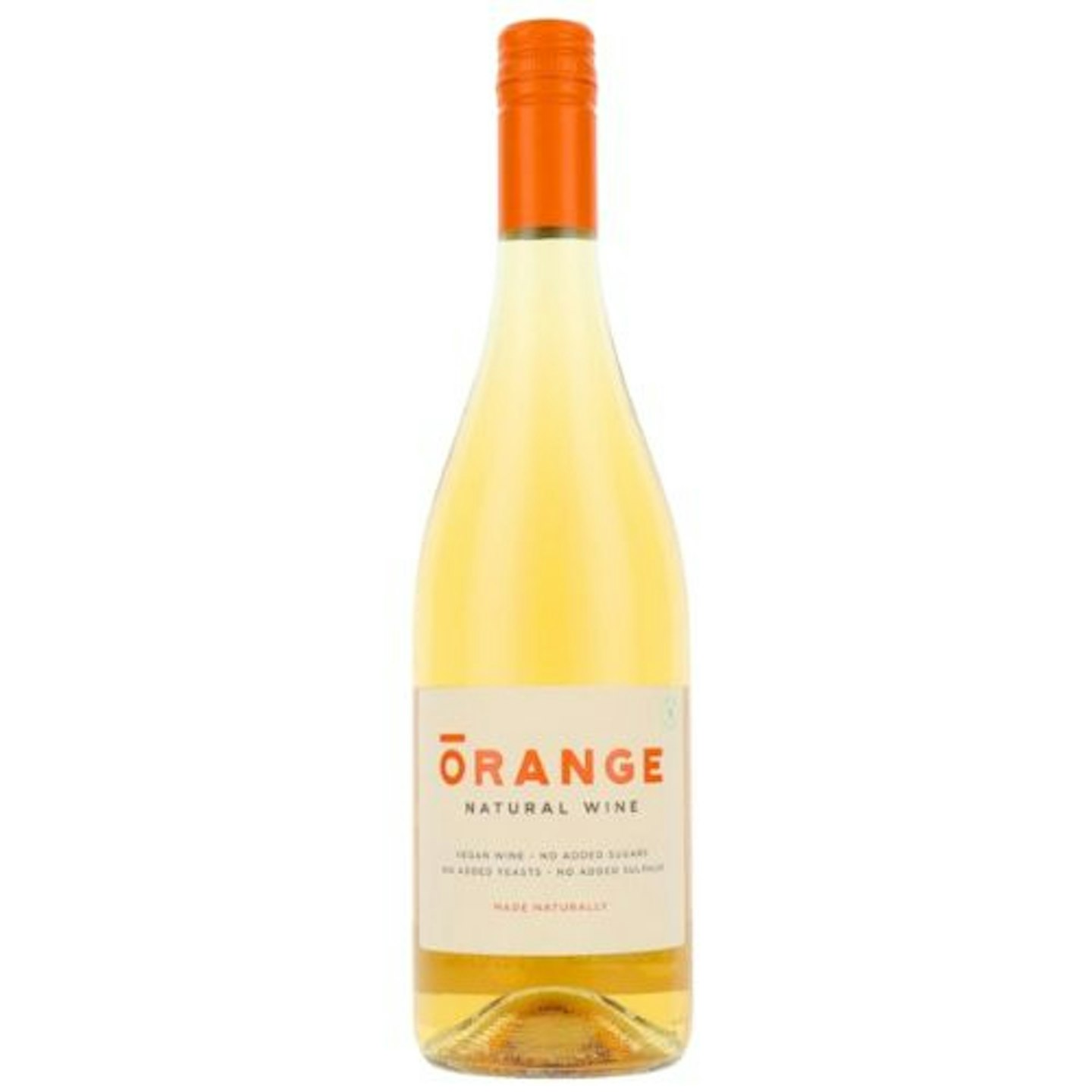 Cramele Recas
Cramele Recaswww.ocado.com
This wine tops our list of best orange wines owing to its unique flavours, authentic make and the good value for money it offers. The wine has strong notes of apricots and orange zest along with the hints of citrus and floral flavours with a nutty and spicy finish that is the result of the skins left in contact for 3.5 weeks. As a vegan option that is suitable for all, your party will be on the second or third bottle in no time.
Pros
- A unique natural wine made with minimal intervention
- Fruity flavours and tannins that are as robust as a red wine
- Low in sulphites
Cons
- It's flavour divides opinion
| ABV: | 12.5% |
| Region: | Cramele Recas, Romania |
| Organic: | Yes |
| Vegan: | Yes |
| Sulphites: | Contains naturally occurring, no added sulphites or sulphur dioxide |
Best award-winning orange wine
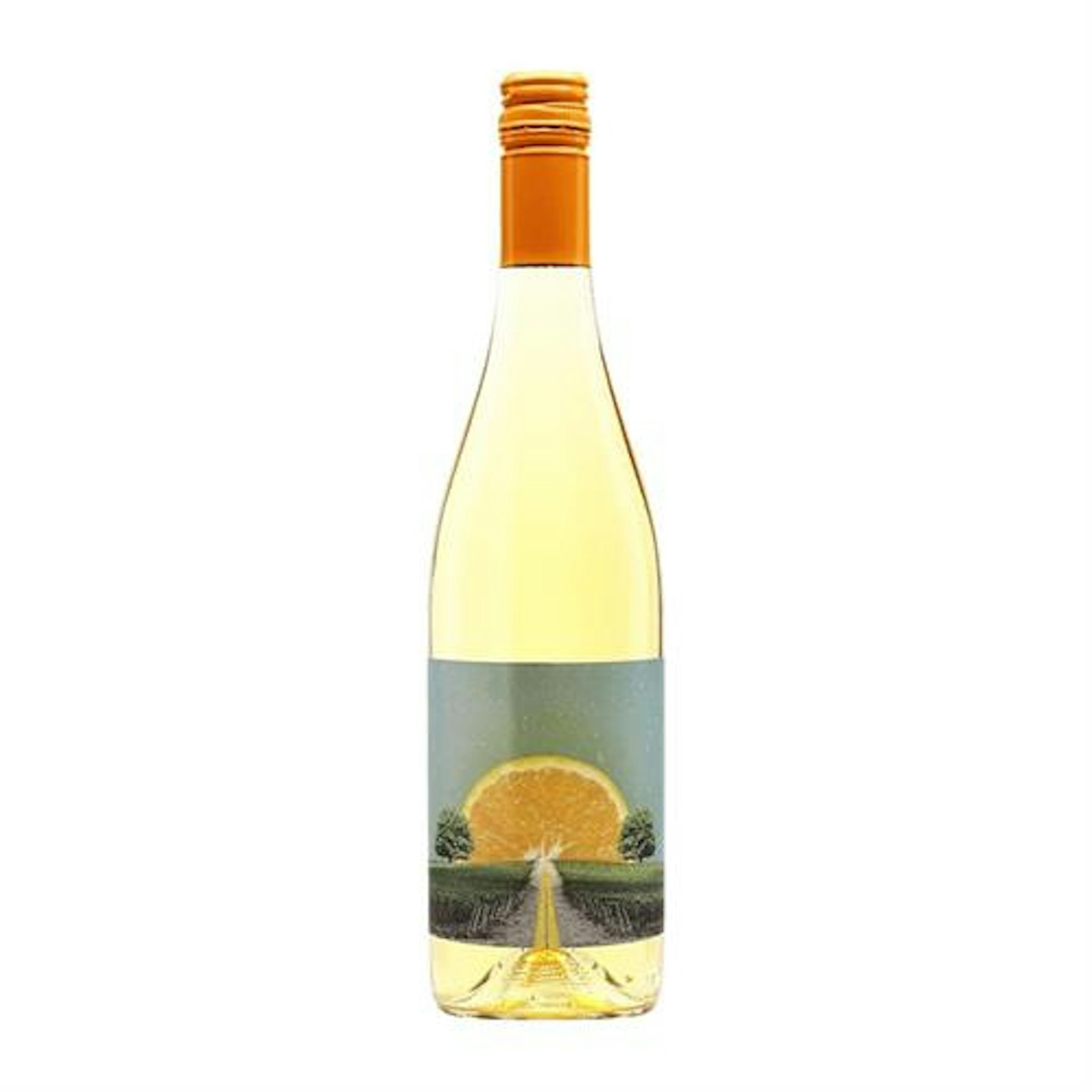 Cramele Recas
Cramele Recasdrinkwelluk.com
If you are looking for a wine option that is easy on the pocket and the palate, then this Cramele Recas Solara Orange Wine will be the perfect accompaniment to your meal. The wine packs flavours of apricots, thyme, caramel and the light, crisp taste of white wine. Made with grapes sourced from Romania, this orange wine is sure to get your guests talking. It was awarded People's Choice Wine Awards Finalist - 2024.
Pros
- Although orange wines are usually dry, this wine is not coarse or barren, but rather round and supple
- Award-winning wine
- Pairs well with robust flavours, such as hard cheese, chicken and tuna steak
- Ferments naturally without the addition of yeast, sulphur or other artificial additivities
Cons
- Need to make note of allergens as the wine contains sulfites
| ABV: | 12.5% |
| Region: | Cramele Recas, Romania |
| Organic: | Yes |
| Vegan: | Yes |
| Sulphites: | Yes |
Best premium orange wine
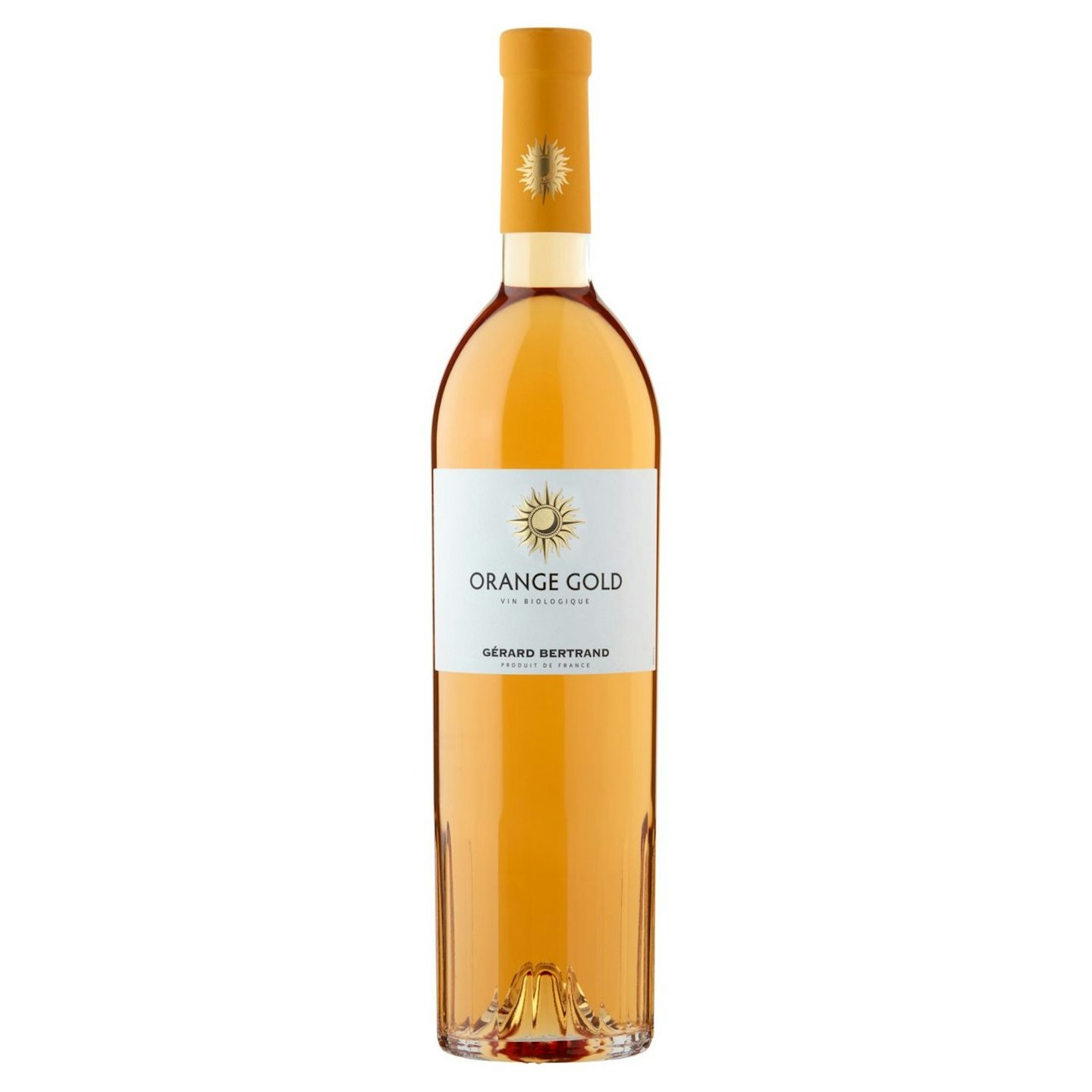 Gerard Bertrand
Gerard Bertrand www.ocado.com
With strong notes of tangerine, spices and citrus fruit along with subtle hints of white flowers, candied fruits and white pepper, this Gerard Bertrand Organic Orange Gold Wine is a premium drink that pairs well with spicy foods. Its robust flavour profile stands up to strong cheeses and makes it a good choice to serve with a variety of dishes. Gérard Bertrand was awarded Master Winemaker, and this particular wine is produced using an ancestral method of fermenting whole clusters of white grapes. Macerating the skins and stalks produces the wine's unique gold colour and captures the flavours of the terroir.
Pros
- Made from organic French grapes
- A unique six-grape blend capturing the terroir of the Mediterranean
- Makes a good aperitif as well as a pairing with bold or piquant flavours
Cons
- Some reviewers felt that the wine was not smooth and that it left a slight burning sensation
| ABV: | 13% |
| Region: | Languedoc-Roussillon |
| Organic: | Yes |
| Vegan: | Yes |
| Sulphites: | Yes |
Best high-end orange wine
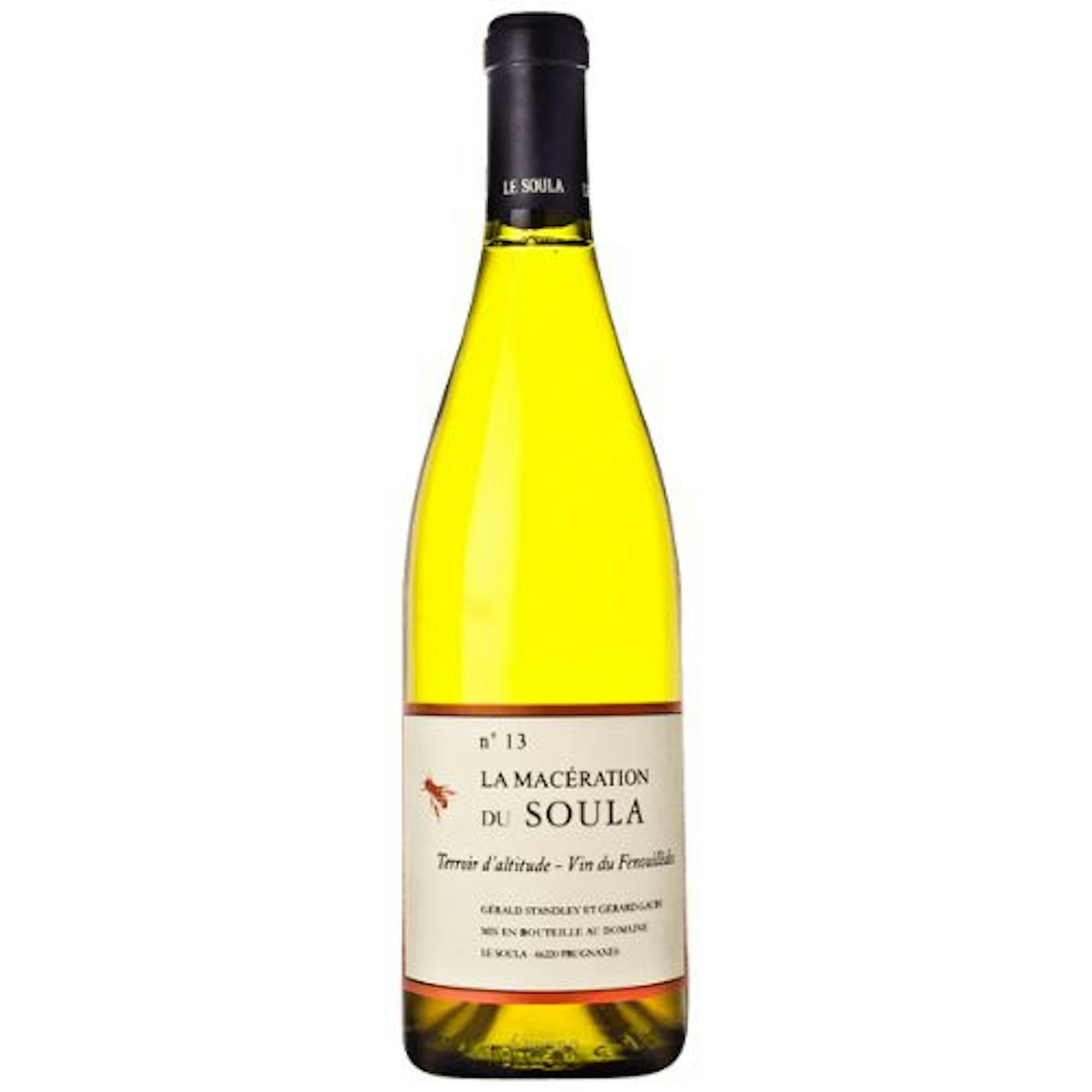 La Maceration du Soula
La Maceration du Soulawww.fortnumandmason.com
The unique climate that creates orange wine makes it a premium product. Domaine Le Soula, La Maceration du Soula Blanc No 19 Orange Wine is made in The Fenouillèdes, which has a rich wine-making tradition. It borders Catalonia and the Languedoc. It has a harsher climate than other regions and produces a distinctive wine.
Pros
- Unique terroir and flavour profile situated between Catalonia and the Languedoc
- Wine lovers will enjoy the history and viticulture around this natural wine
Cons
- Perhaps best suited to wine specialists, as the flavour is very distinct
| ABV: | 13% |
| Region: | Fenouillèdes |
| Organic: | Yes |
| Vegan: | Yes |
| Sulphites: | Yes |
Best Tesco orange wine
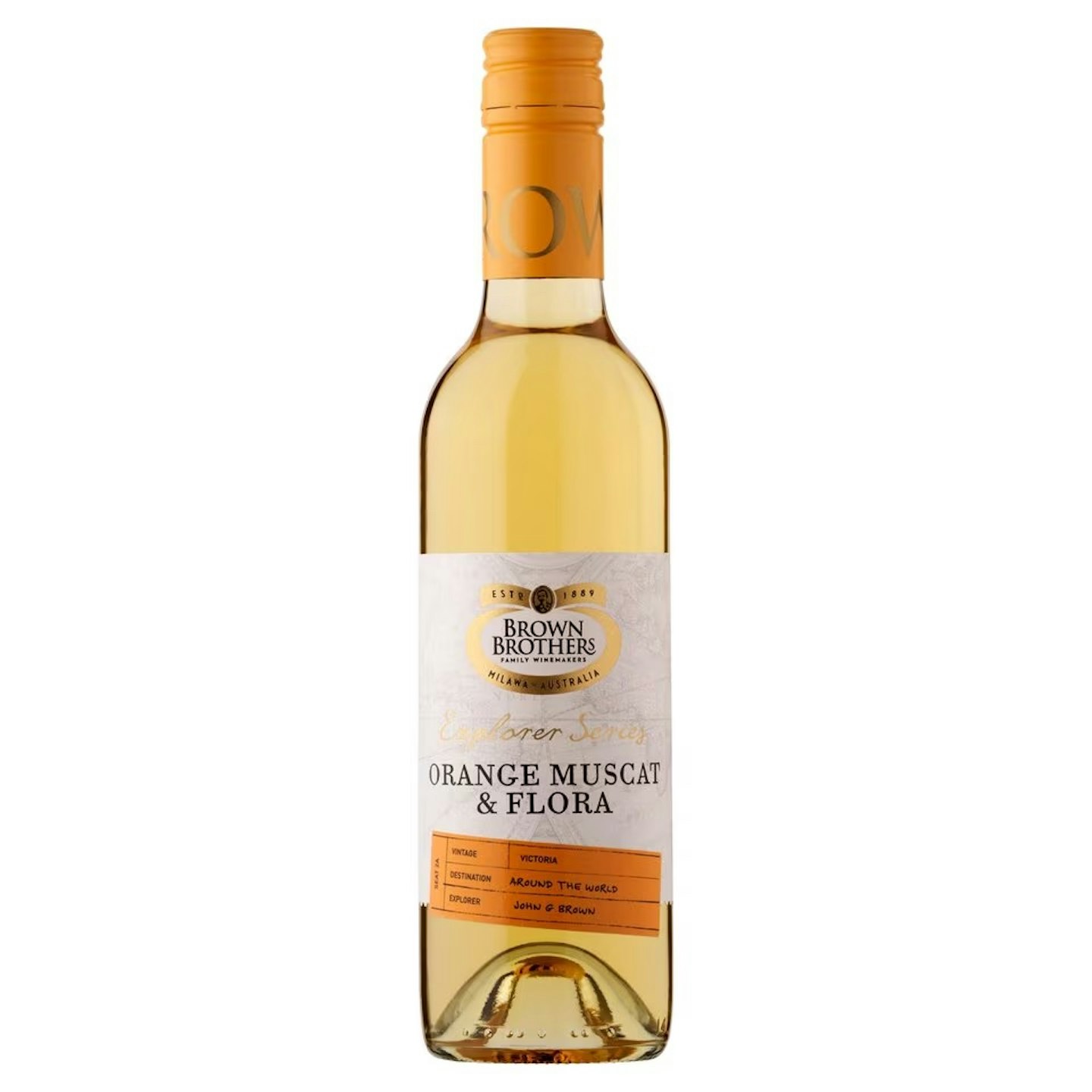 Brown Brothers
Brown Brotherswww.tesco.com
This wine is made of orange Muscat fruit that is blended with the rare Flora grape to create a sweet, rich and beautifully balanced wine. It pairs well with fruits, sweet delicacies and blue cheese especially. It can also be served as a dessert wine. The wine also comes with the legacy of being created by the well-known winemakers and explorers, John Graham Brown and his brothers.
Pros
- Tastes sweeter than most orange wines
- An innovative New World wine
- Its sweet, rich and balanced flavour may be more palatable than some of the other natural wines
Cons
- It might not appeal to those who prefer strong wines
| ABV: | 9.5% |
| Region: | Victoria, Australia |
| Organic: | Not specified |
| Vegan: | No, vegetarian |
| Sulphites: | Yes |
Best Waitrose orange wine
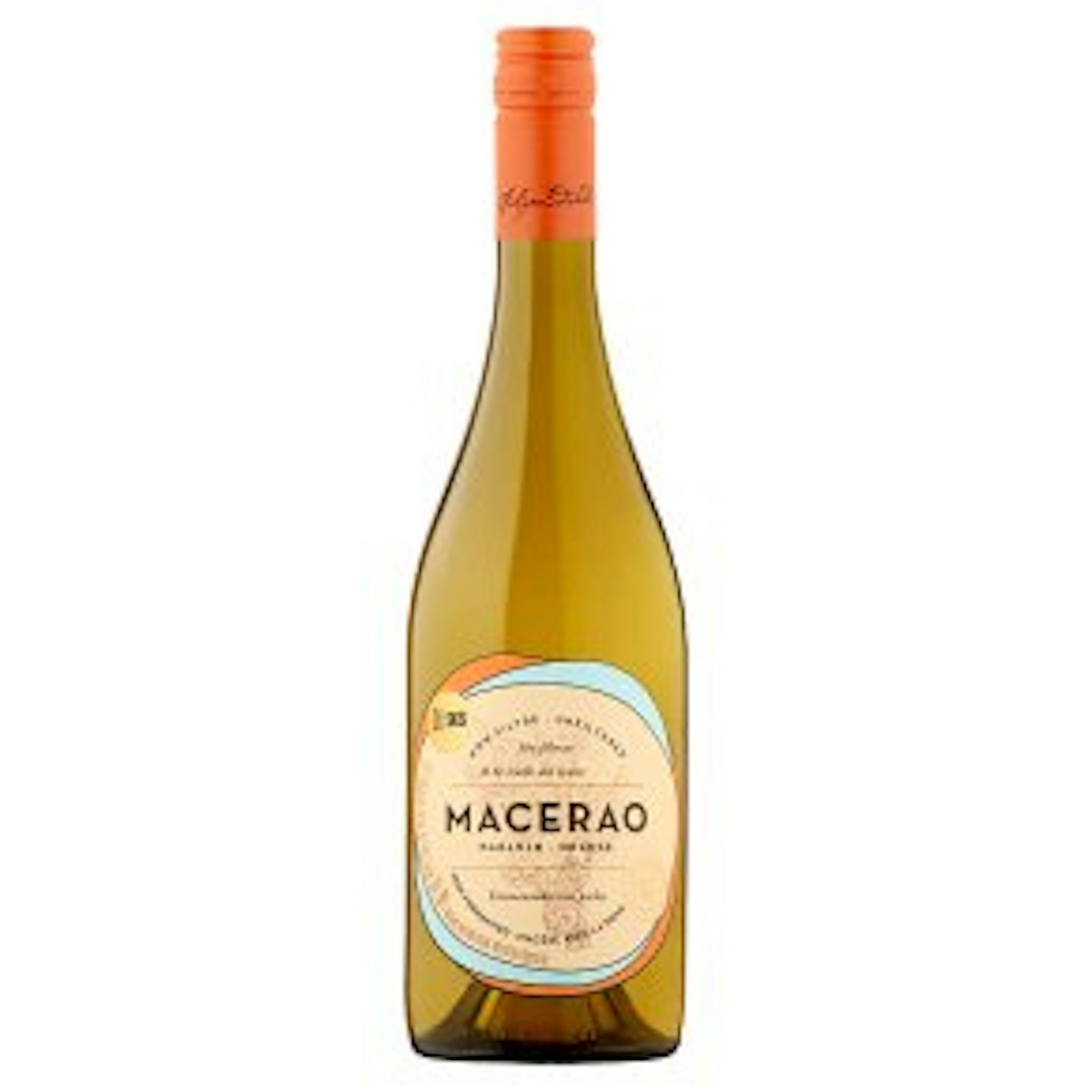 Macerao
MaceraoThis skin fermented Macerao Naranjo Orange wine is made from the Moscatel de Alexandria grapes and is fermented with wild yeasts. The wine comes with a rich aroma of orange blossoms, dried apricots, pears and honey with a full body and hints of fruity notes. According to the reviews of those who have tried this wine, you will either love it or hate it. So if you are familiar with the taste of natural wines or skin-contact wines, then this bottle might be another good find.
Pros
- Crafted using artisanal methods, including hand-harvested grapes
- Fermented using natural yeasts
- Rich, fruity and honey flavours
Cons
- Wide range of options on its flavour in reviews – love it or hate it
| ABV: | 12.5% |
| Region: | Itata Valley, Chile |
| Organic: | Yes |
| Vegan: | Yes |
| Sulphites: | Yes |
Best M&S orange wine
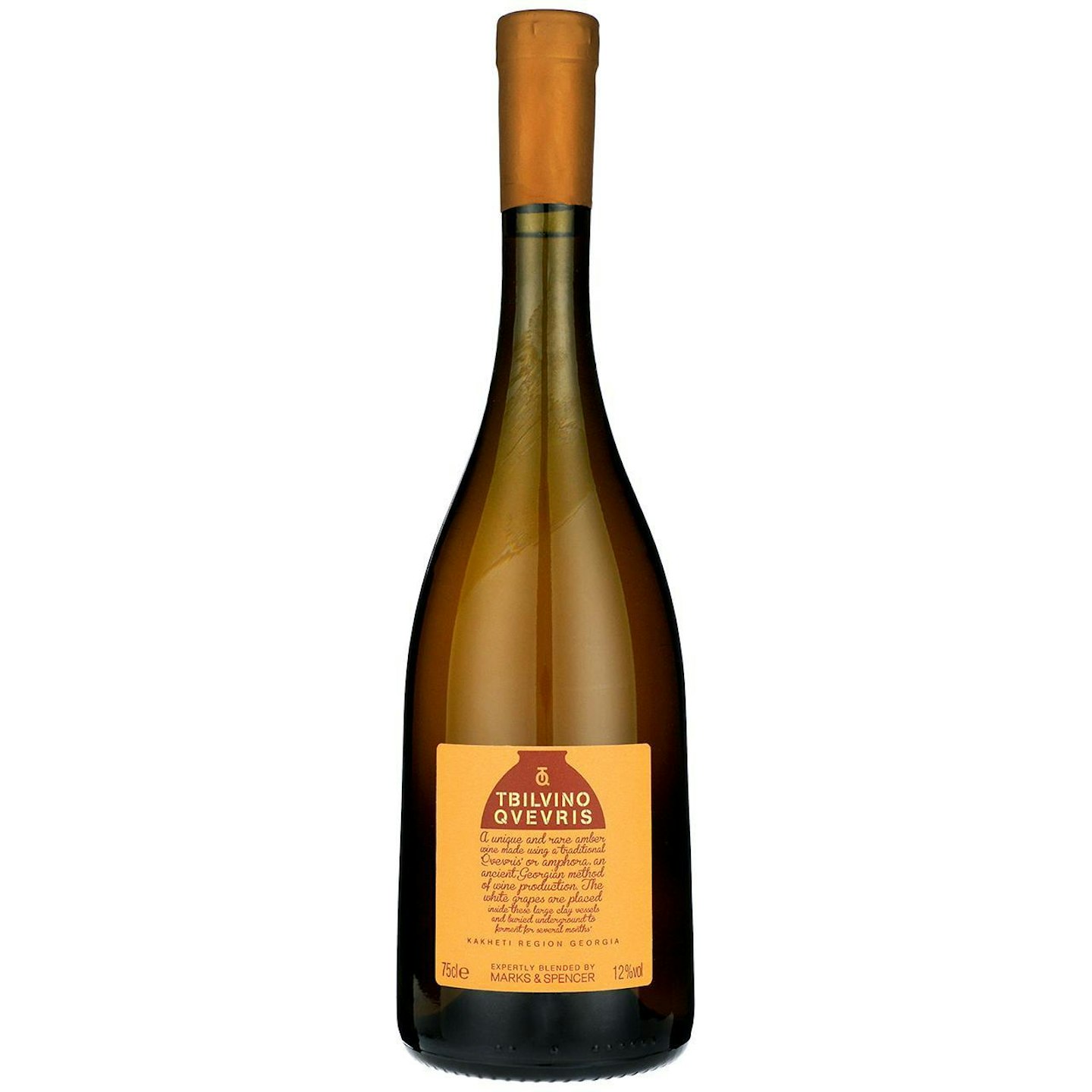 M&S
M&Swww.ocado.com
This M&S Tbilvino Qvevris Orange Wine has rich flavours of quince, pear and spice and is made with white Rkatsiteli grapes using the traditional Georgian vinification method. This dry wine pairs very well with dishes like seafood platters or chicken tagine. As an option that is suitable for vegans as well, this wine can be enjoyed by all.
Pros
- Best served chilled for a dry and refreshing aperitif
- Pairs beautifully with seafood or spicy tagines
- Deep amber wine with notes of quince, pear and spice
- Created using an ancient Georgian vinification method
Cons
- Need to make note of allergens as the wine contains sulphur dioxide / sulphites
| ABV: | 12% |
| Region: | Kakheti, Georgia |
| Organic: | Not specified |
| Vegan: | Yes |
| Sulphites: | Yes |
Best ASDA orange wine
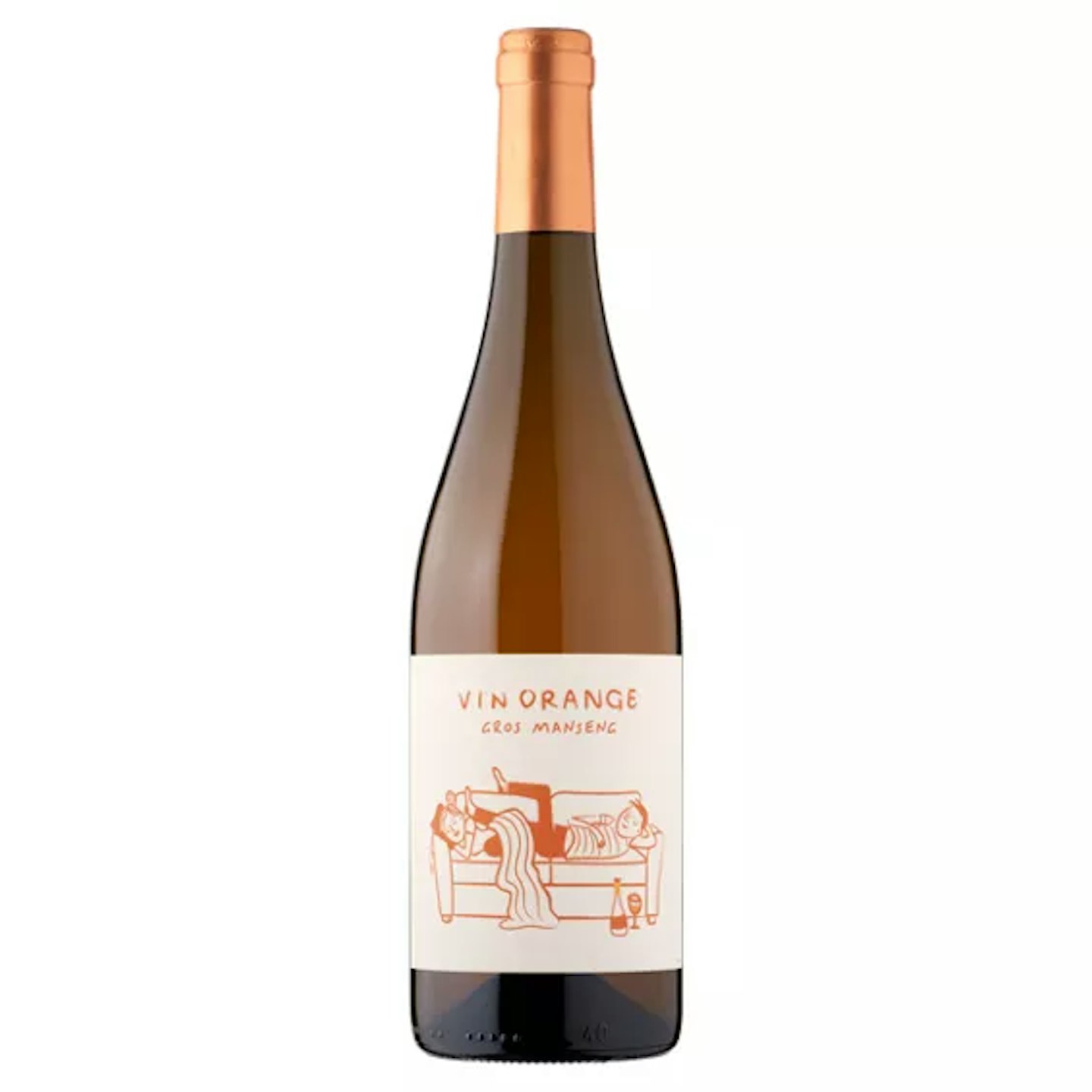 Gros Manseng
Gros Mansenggroceries.asda.com
This Gros Manseng Vin Orange comes with flavours of white peach, citrus zest and ripe mango creating a unique taste and aroma. A reviewer mentioned that the wine pairs beautifully with Chinese cuisine. So if are looking to quickly pick up a bottle along with the rest of your groceries, then this option could be the best for you. It's exclusive to ASDA and an award-winning wine: Decanter World Wine Awards Bronze Winner 2024 and IWSC Bronze Medal Winner 2024.
Pros
- Has the depth of flavour of a red wine
- Floral nose, tangy acidity and long, complex finish
- Award-winning wine
Cons
- Several reviews indicate it tastes vinegary or that they received a corked wine
| ABV: | 12% |
| Region: | Cahors, France |
| Organic: | No |
| Vegan: | No |
| Sulphites: | Yes |
Best new to market orange wine
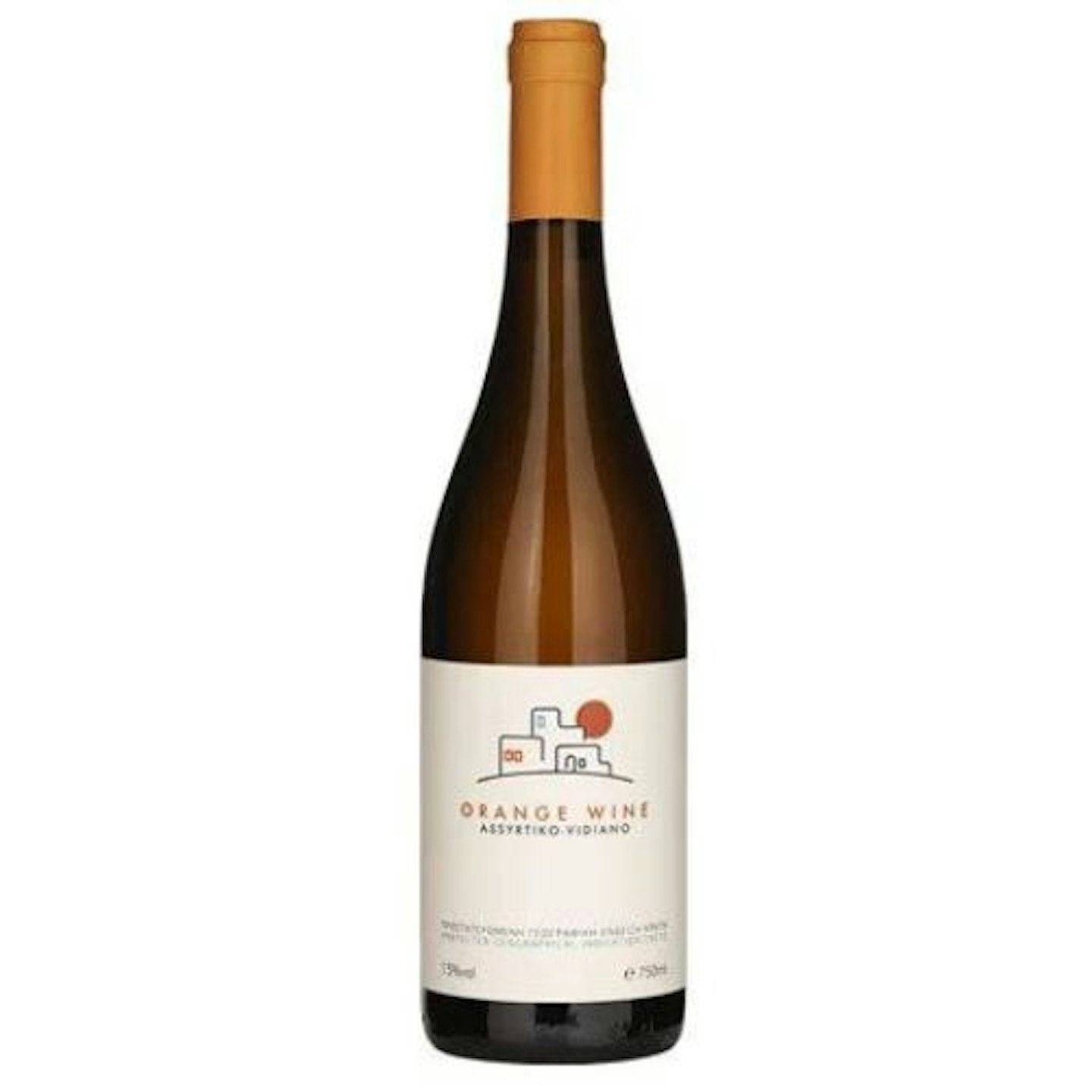 Lyrarakis Assyrtiko-Vidiano
Lyrarakis Assyrtiko-Vidianowww.majestic.co.uk
For a wine to transport you to the Mediterranean sun and sea, try Lyrarakis Assyrtiko-Vidiano Orange Wine from Crete. The Lyrarakis family, renowned winemakers in Crete since 1966, crafts this Greek orange wine using Assyrtiko and Vidiano grapes grown at high-altitude vineyards. With notes of stone fruits, citrus peel and a hint of tannin, it pairs beautifully with semi-hard cheeses or creamy white meat dishes.
Pros
- Rich and complex with stone fruits, citrus peel and light tannins
- Made by the renowned Lyrarakis family with deep winemaking traditions
- Complements semi-hard cheeses and creamy white meat dishes
Cons
- Not for casual dining, it requires thoughtful pairing to fully appreciate its flavours
| ABV: | 13% |
| Region: | Heraklion, Crete |
| Organic: | No |
| Vegan: | Yes |
| Sulphites: | Yes |
Orange wine FAQs
What is the difference between orange and rosé wine?
The basic difference is that rosé is made with red grapes and less skin-contact time compared to red wine while orange wine is made with white grapes with more skin-contact time than white wine. The colour of the wine is determined by the amount of time the wine is in contact with the skin of the grapes during the making process, resulting in the varying colours of these varieties of wine.
Is orange wine served chilled?
It is recommended to serve orange wine slightly chilled. But it is advised to not serve it too cold as it will tone down all the flavours.
How is orange wine made?
Because orange wine is a white wine that is made like red wine (by keeping the skin of the grapes on during the making process), orange wines also go by the terms 'macerated wine' or 'amber wine'. The colour of the wine deepens with the time spent with the grape skins, which also adds to the taste, intensity, and fragrance of the wine. Usually, these wines only use local yeast for fermentation, which gives them a lower alcohol percentage and a lighter body. The making process is also much more natural, with the skin remaining on.
This technique of making skin-contact wines, which is said to have originated in Georgia, goes back centuries. As the most natural method of making wine, this traditional process is as old as wine itself. Carrying the legacy of winemaking, a bottle of orange wine is sure to bring stories both old and new to the table.
Akhila Thomas is a digital writer at Yours.co.uk and her areas of interest are beauty, fashion, food, wellness and lifestyle. She has previously written for magazines like Leftlion, Women’s Health and t’Art and worked extensively with art, culture, fashion and social media trends. She also likes to travel and explore new cultures and cuisines.

